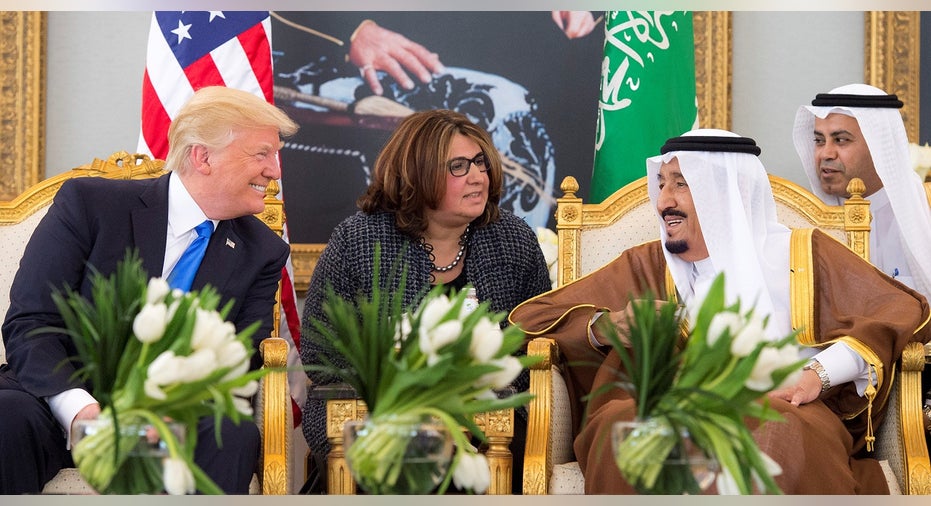Under fire at home, Trump wins warm welcome in Saudi Arabia

Dogged by controversy at home, U.S. President Donald Trump won a warm reception in Saudi Arabia on Saturday but struggled to shift attention from the political firestorm over his firing of former FBI Director James Comey.
A $110 billion deal in which Saudi Arabia will buy U.S. arms to help it counter Iran, with options running as high as $350 billion over 10 years, was the central achievement of Trump's first day in Riyadh, first stop on a nine-day journey through the Middle East and Europe.
Speaking to journalists after a ceremony to exchange agreements, Trump said it was a "tremendous day" and expressed his thanks to Saudi Arabia.
"Tremendous investments in ... the United States, and our military community is very happy," he said.
"Hundreds of billions of dollars of investments into the United States and jobs, jobs, jobs. So I would like to thank all of the people of Saudi Arabia."
But the turmoil back home consumed the headlines and cast a long shadow over his first foreign trip as president.
His firing of Comey and the appointment of a special counsel to investigate his election campaign's ties to Russia last year have raised the question of whether he tried to squelch a probe into the alleged Russia connection.
Fanning the flames was a New York Times report that Trump had called Comey a "nut job" in a private meeting last week in the Oval Office with Russian Foreign Minister Sergei Lavrov and ambassador Sergei Kislyak. The Times quoted briefing notes of the conversation.
Asked for a response, the White House said that for national security reasons, "we do not confirm or deny the authenticity of allegedly leaked classified documents."
Russia's Interfax news agency on Saturday quoted Lavrov as saying he had not discussed Comey with Trump. "We did not touch this issue at all," the minister said.
In another development, the Washington Post said a current White House official close to Trump was a significant "person of interest" in the investigation into possible ties with Russia.
The fallout followed Trump to Riyadh but did nothing to cool the welcome he received by the royal Saudi family.
King Salman bin Abdulaziz greeted Trump on a red carpet as he stepped off Air Force One, shaking the hand of his wife, Melania, and riding in the U.S. presidential limousine.
CONTRAST WITH OBAMA VISIT
It was a more favorable welcome than had been granted last year to Trump's predecessor, Barack Obama, who was seen in the Arab kingdom as soft on Iran and hesitant on Syria.
Trump's trip to Saudi Arabia, Israel, Italy, the Vatican and Belgium has been billed by the White House as a chance to visit places sacred to three of the world's major religions, while giving Trump time to meet with Arab, Israeli and European leaders.
Trump and King Salman seemed at ease with each other, chatting through an interpreter. At the royal al-Yamama palace, the king draped around Trump's neck the King Abdulaziz medal, the country's top civilian honor.
The king was overheard lamenting the Syrian war to Trump, who ordered air strikes against a Syrian airfield in April in response to a chemical weapons attack by government forces against civilians.
"Syria too used to be one of the most advanced countries. We used to get our professors from Syria. They served our kingdom. Unfortunately, they too brought destruction to their own country. You can destroy a country in mere seconds, but it takes a lot of effort," he said.
Trump's response could not be heard.
The president’s decision to make his first official trip abroad to Saudi Arabia, followed by Israel, countries which both share his antagonism towards Iran, marks a contrast with Obama's approach.
Trump’s criticism of the nuclear deal Iran reached with the U.S. and five other world powers in 2015 pleases both Saudi Arabia and Israel, who accused Obama on “going soft” on Tehran.
Poll results showed on Saturday that Iranians had emphatically re-elected President Hassan Rouhani, architect of Iran's still-fragile detente with the West.
HELICOPTERS
The arms package includes a pledge by the kingdom to assemble 150 Lockheed Martin Blackhawk helicopters in Saudi Arabia, in a $6 billion deal expected to result in about 450 jobs in the kingdom.
National oil giant Saudi Aramco was also expected to sign $50 billion of deals with U.S. companies on Saturday, part of a drive to diversify the kingdom's economy beyond oil exports, Aramco's chief executive Amin Nasser said.
U.S. technology and engineering conglomerate GE said it had signed $15 billion of agreements with Saudi organisations.
Trump is to deliver a speech in Riyadh on Sunday aimed at rallying Muslims in the fight against Islamist militants. He will also attend a summit of Gulf leaders of the six-member Gulf Cooperation Council.
Ahead of Trump's trip, the White House said the president expected tangible results from Saudi Arabia in countering Islamic extremism.
Shortly after taking office, Trump sought to block people from several Muslim-majority nations from entering the United States, but the travel ban has been blocked by federal courts.
The 70-year-old president's trip to Saudi Arabia, Israel, Italy and Belgium will be Trump's longest time away from the White House since he took office four months ago.
The uproar over Comey's firing looked unlikely to go away. Moscow has denied any interference in the 2016 election. Trump has denied collusion and denounced the appointment of a special counsel as part of a "witch hunt".
(Editing by Sami Aboudi and Andrew Roche)



















